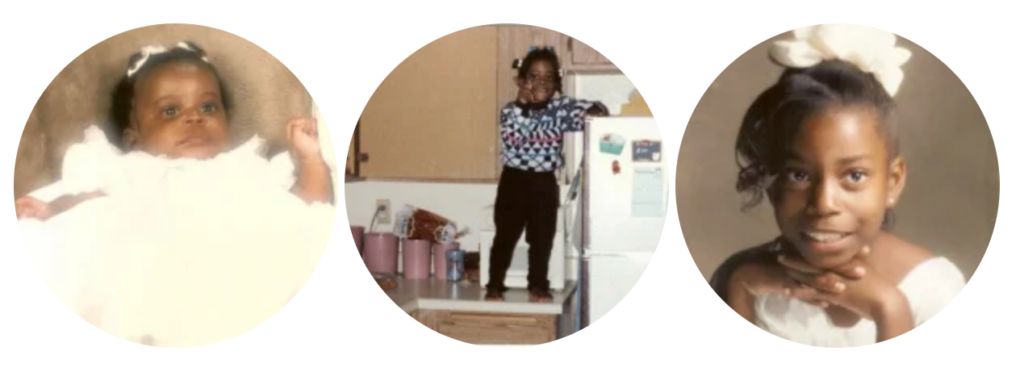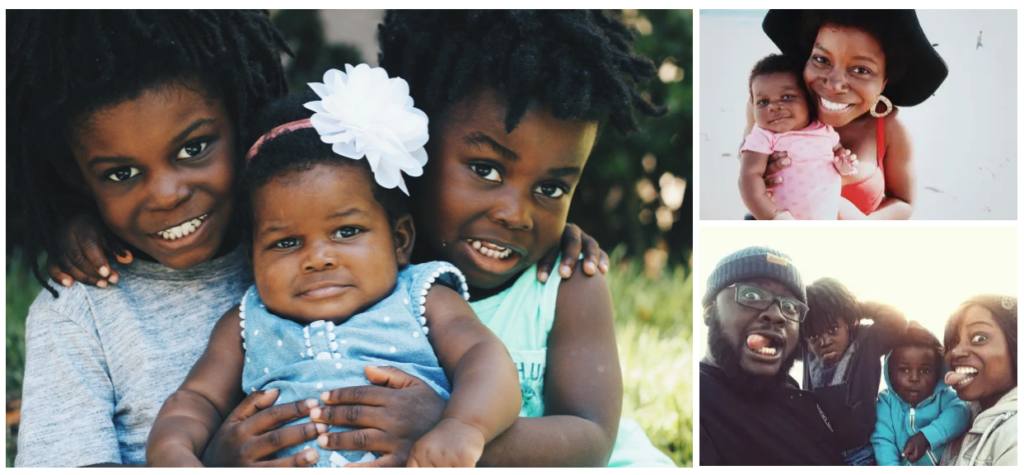Great question.
The reality of the situation is my whole life schoolmates, teachers, peers, family, friends, etc. have (in some form or fashion) expressed expectations of who I am because of the complexion of my skin. From a very young age, there are stereotypes that have been projected on me of the type of woman I should be. I remember being called an “oreo” because I was black on the outside but white on the inside, so “they” said. It was often suggested that I “acted white” or wasn’t “black enough.” Imagine being told these things in my formative years. Imagine the confusion that I must have been dealing with internally. A video my husband posted today triggered some reflection on my years growing up as a black girl in sunny San Diego. I appreciate the way he was able to express himself in response to comments he’s received on videos from passersby.
Before I come alongside him to express myself in relation to raising black children, I’d like to share my perspective growing up black in California. I’m sure I was aware my complexion was darker in Elementary school, but most of my reflection of being black begins at the middle school level. I went back to look at the School Accountability Report Cards (SARC) for the schools I attended in Oceanside. The demographics reported on these reports were not from the years that I went to school, but based on what I found I don’t imagine that it was too much different when I was a student in the district. I found that the student population at the high school I attended was/is less than 8% Black/African American. From there I looked up demographics of the private Christian college I attended in San Diego, there the Black/African American population was/is less than 3%. I didn’t look up the demographics of the university I attended to get my teaching credential, but I remember being one of two black people in our cohort. I remember this because we were often mistook for one another. At least, I remember being called by her name on a few occasions. In fact, one time I called out my professor for doing so. That was a tough/awkward conversation to have as a 22 year old.
I bring up these demographics because growing up I was always aware I was black. I remember sitting in AP classes as one of only a handful of black students. I remember being asked about the “black experience” as if I was the spokesperson for all black people. I remember not feeling like I belong to any one social group. I remember having friends, but secretly wanting to be accepted by those who looked like me. I remember playing with dolls that did not reflect anything about my physical attributes. I remember watching shows that didn’t have actors/actresses with my same complexion. I remember hoping to have that one black teacher each year.
I remember…
I remember being the only black girl on the hall in the dorms. I remember being told I was the first black friend of a peer. I remember taking a weekend trip home with a girlfriend, and being told I look like Whoopi Goldberg by her dad. I remember being compared to the first black woman that came to anyone’s mind. I remember feeling self-conscious to sit with other black students at my university as to not make others feel uncomfortable. I remember needing to be in community with people of color at my university because I needed to feel as though I belonged.
I remember…

I remember the sting of being called an oreo. I remember the confusion of what it means to act “black.” I remember the shame I’ve felt when attempting to “act black.” I remember the disgust I felt/feel when people who are not black change their tone of voice or pattern of speech when holding a conversation with me. I remember the disappointment I felt/feel when people assume things about me that are in no way true based on the color of my skin. I remember being the token black kid. I remember being the picture of “diversity” while simultaneously feeling not black enough.
I remember…
I remember becoming an educator. I remember wanting to be a picture of hope for young black children. I remember longing to snatch them up and tell them you are more than the stereotypes that people are projecting on you. I remember just recently a relentless drive to bring a black student union to a campus that had none, because I remember how much life it brought to me being a part of one from high school through to college. I remember the response of administrators, parents, students and teachers when that club came about & I remember the disappointment I felt that they didn’t understand the need for not just our students of color but all students to have a safe place to come to discuss the nation’s current climate surrounding race. I also remember the pride I felt when we hosted the first black history month assembly. I remember the feeling of being choked up as the choir sang “I will rise up…” and the student body rose up and began singing it with them.
I remember…

I remember becoming a mother to a precious black boy, Theophilus Patrick, on Friday, February 9, 2013. I remember being in complete awe of him and the miracle of being able to bear children and care for them. I remember Uriah Beau joining my quiver on Friday, June 27, 2014. I remember feeling so discouraged last year by the deaths of black boys and men at the hand of the ones we pay to serve and protect. I remember fearing for my husband’s safety when he would go out. I remember the weight of motherhood becoming even heavier as I looked ahead to the fact that one day my boys are not necessarily going to be considered cute chocolate babies. I remember finding out I was pregnant with a baby girl. I remember the weight of motherhood becoming even more heavier because I remembered what it was like growing up a little black girl; and I remember the little black girls that have passed through my classroom who I’ve wanted to tell that they are black and they are beautiful and they are loved and they have a voice and they are seen. I remember Anaya Zai making her debut on Friday, March 17, 2017. I remember the pride I felt holding her in my arms.
I remember.
So, when people ask “why is it always about being black?” It’s because I remember. For my children, they will know they are black. They will know that God especially made them that way. They will know that everything God touches is good. They will know they are loved, valued and seen. They will know their voice is unique and they have a right and a responsibility to be heard. They will know they are not defined by the color their skin. They will know they are defined by the content of their character. They will know that their identity is in Christ. They will know this because my husband & I will not allow the world to tell them who they are or who they’re supposed to be. Our home will be a place where we are constantly pointing them to Christ, but not allowing them to stay ignorant to the fact that their melanin is poppin and not everyone in the world will know how to interact with that reality. I was going to begin this sentence with, “It will always be about being black until… [insert things that need to change]” But never mind.
It will always be about being black because…

… when I pick out books to read to my children, I have to do extra research to find books that include images of children of color.
… it took 44 presidencies for a black man to become POTUS, and America still couldn’t handle that.
… there are no bandaids that blend in to the color of their skin.
… I have to explain to my children why another child expressed to them their “hair would be perfect for crazy hair day.”
… it is very likely they will be the only (or one of a few) black kid(s) in a classroom setting.
… ignorance is bliss.
… Black IS Beautiful!!!
Now, please don’t assume that because I celebrate the fact that we are black that I completely disregard other skin tones. That is NOT the case at all, and I hate that I even have to add this disclosure. I find beauty in all skin tones and all cultures and love all people for the beauty that God has created in them.

#TeamMelanins
Hey, hey! I'm Yvette!
I'm a thirty-four year old wife, mother of four, podcast host, and writer from San Diego, California. I'm a former math teacher turned stay-at-home parent and influencer with the unique opportunity to bring women into community with one another and encourage them in their seasons of life through my podcast, Yvette, Unplugged and my online community, Women, Unplugged.
More about me!